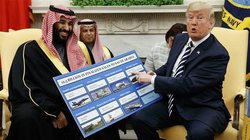 US Secretary of State Mike Pompeo confirmed that the administration has invoked a rarely-used legal statute to “immediately” clear $8.1 billion in arms sales to its Arab allies in order to “deter Iranian aggression”.
US Secretary of State Mike Pompeo confirmed that the administration has invoked a rarely-used legal statute to “immediately” clear $8.1 billion in arms sales to its Arab allies in order to “deter Iranian aggression”. RNA - The transfer of weapons to Saudi Arabia, the United Arab Emirates and Jordan, which reportedly includes a number of Raytheon precision-guided munitions (PGMs) and Javelin anti-tank missiles, cannot be delayed any longer “during a time of increasing regional volatility”, Pompeo said in a statement on Friday, RT reported.
That “volatility”, according to the top US diplomat, comes from Iran, whose perceived “threat” the Donald Trump administration has been drumming up in the recent weeks.
The Pentagon has sent a carried group, bombers, air defense missiles and 1,500 troops to the region, having accused Tehran of an ongoing “campaign” against Washington's allies and interests.
"These sales will support our allies, enhance Middle East stability, and help these nations to deter and defend themselves from the Islamic Republic of Iran," Pompeo added, criticizing the Senate for stalling on the review of the deals.
Foreign arms sales normally require congressional review, but the law allows the president to skip legislative approval by declaring an emergency and citing “national security interests”. The same method was used to sell weapons to Saudi Arabia in the run-up to the 1991 Gulf War and the 2003 invasion of Iraq.
Lawmakers have been refusing to give their seal of approval to the weapons sales, in part due to concerns over the reports of mounting civilian casualties in the Saudi-led bombing campaign in Yemen.
Senator Robert Menendez (D-New Jersey), ranking member of the Senate Foreign Relations Committee, blasted the Trump administration’s decision to move ahead with the sales while sidestepping a congressional review.
"I am disappointed, but not surprised, that the Trump administration has failed once again to prioritize our long-term national security interests or stand up for human rights, and instead is granting favors to authoritarian countries like Saudi Arabia,” Menendez stressed.
Without going into specifics of the deliveries, Pompeo noted that the military equipment that to be shipped to the Arab countries includes “intelligence, surveillance and reconnaissance (ISR), munitions, and other supplies”.
However, according to a report by Reuters that cited the notification sent to Congress, they would include offensive weapons. That had become the bone of contention between the White House and lawmakers.
According to a congressional aide cited by Reuters, Congress had in principle agreed to clear the way for defensive weapons sales, but refused to budge in on the offensive arms out of concern they might be used to bomb civilians in Yemen.
In an apparent attempt to reassure lawmakers that the administration will not make a habit of using the provision, Pompeo's statement said the delivery would be “a one-time event".
Pompeo referred to the ongoing US military build-up at Iran’s doorstep, adding that the sales will “reinforce recent changes to US posture in the region to deter Iran”.
Washington has so far provided little evidence or details on Iran's alleged threat, describing it in vague terms and claiming that it has not materialized precisely due to the US build-up.
President Donald Trump has also approved a deployment of 1,500 troops to the Middle East, apparently meant to deter what Washington calls an ongoing threat to US interests from Iran.
“It will be about 1,500 people,” Trump told reporters at the White House as he was leaving for a trip to Japan, adding, “We want to have protection.”
The deployment will happen in the coming weeks, according to a copy of the announcement obtained by the Associated Press. The forces’ “primary responsibilities and activities” would be “defensive in nature”, it said.
The US president dismissed the speculation that the deployment would further raise tensions between Washington and Tehran.
“I don't think Iran wants to fight. And I certainly don't think Iran wants to fight with us,” Trump told reporters.
847/940